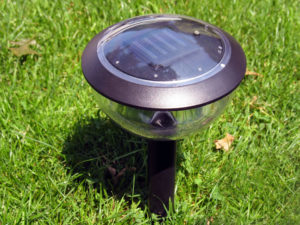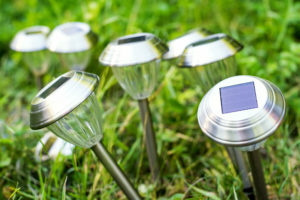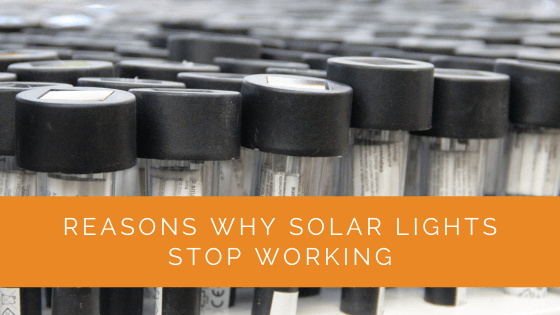Solar lights are a great way to reduce your electricity bill, but they can also stop working. There are many reasons why solar lights stop working, which is why you need to know the most common ones so that you can fix them before they happen again. Here are six common reasons why solar lights might not be producing any light at all:
Contents
- 1 Key Takeaways
- 2 Why Solar Lights Stop Working
- 2.1 1. The Solar Panel Is Not Receiving Enough Sun
- 2.2 2. The Battery Needs to Be Replaced
- 2.3 3. The Solar Light Has Been Left on All Night and Drained the Battery
- 2.4 4. There Are Problems with The Wiring or Connections in The Solar Light Itself
- 2.5 5. The Bulb Inside of The Solar Light Has Burned out And Will Need to Be Replaced
- 2.6 6. Excessive Moisture
- 3 How To Fix Solar Lights That Won’t Turn On
- 4 Case Study: Troubleshooting and Resolving Common Issues with Solar Lights
- 5 Expert Insights From Our Solar Panel Installers About Common Reasons Why Solar Lights Stop Working
- 6 Our Expertise in Solar Lights
- 7 Conclusion
- 8 Why Solar Lights Stop Working FAQ
Key Takeaways
- The most common reasons why solar lights stop working include a lack of sunlight due to dirty panels or obstructions, a dead or worn-out battery, leaving the lights on all night, wiring or connection issues, burnt-out bulbs, and excessive moisture causing corrosion.
- To fix solar lights that won’t turn on, check the battery and replace it if needed, replace burnt-out bulbs with LED or CFL bulbs, ensure the solar panel receives adequate sunlight, replace a faulty switch, repair damaged wiring, or reset the timer according to the manufacturer’s instructions.
- Regular maintenance, such as cleaning panels and checking for obstructions, can help prevent common issues and ensure your solar lights continue to work efficiently.
Why Solar Lights Stop Working
1. The Solar Panel Is Not Receiving Enough Sun
The solar panel does not receive sunlight for a few reasons. One reason may be that the panels are dirty, which will prevent it from producing light or charging batteries.
You can clean them with a wet cloth and some water to see if this works in your case, but you should make sure to do so during daylight hours when there’s still sunlight available because trying to clean the solar panels at night won’t work very well since they need direct exposure to strong lights.
Another possible cause of lack of lighting might be due to shadows cast by trees or other objects around your home blocking how much light reaches the panel itself, causing its effectiveness at gathering energy to plummet dramatically as a result.
This means that trimming trees or moving objects around your home might help increase the amount of sunlight that the solar panels can absorb.

2. The Battery Needs to Be Replaced
Over time, the battery will slowly lose its charge and eventually stop working. This means that you might need to replace the battery every few years or so to ensure your solar light continues to work.
If your solar light isn’t shining as brightly as it used to or if it isn’t turning on at all, the problem may be with the battery. Solar batteries tend to last a long time; however, This means that you might need to replace the battery every few years or so to ensure your solar light continues to work.
3. The Solar Light Has Been Left on All Night and Drained the Battery
If you leave your solar light on all night, it will eventually drain the battery and stop working. Solar lights are designed to turn off automatically after a few hours of use or when they sense that there’s not much sunlight left in their vicinity.
However, if you keep turning them back on every time this happens without charging the batteries first, then they’ll continue to lose energy until one day they won’t work at all because the battery is completely drained out.
If this has happened with your solar lights before, You can either switch them off manually yourself or replace the batteries altogether so that you don’t have any problems powering them again later down the line.
4. There Are Problems with The Wiring or Connections in The Solar Light Itself
If your solar light is not turning on, there may be problems with the wiring or connections in the solar light itself. This can be caused by several things such as water damage, corrosion, and even squirrels chewing through the wires.
To determine if this is the problem, you’ll need to take a look at the solar panel, battery compartment, and light fixture itself for any visible damage. If you do spot any issues, then you can try repairing them yourself or taking it in for repairs.
However, if you’re not comfortable doing either of those things yourself or don’t have time to do so, then you might want to consider just purchasing a new solar light instead.
5. The Bulb Inside of The Solar Light Has Burned out And Will Need to Be Replaced
If you have a solar light with an incandescent bulb, then over time the filament inside of it will burn out and no longer allow for energy to flow through. This means that the only way to fix this problem is by replacing the burned-out bulbs with new ones.
To prevent this from happening in the future, you can try using LED lighting instead since they’re more durable than regular lights and won’t need to be replaced as often.
However, if your solar light has already stopped working due to a burnt-out bulb at some point in the past or even recently but didn’t come with any replacement bulbs included when you purchased it originally, Then you might want consider purchasing them separately so that you don’t have to replace the entire solar light later on down the line.
6. Excessive Moisture
If you live in an area that experiences a lot of rain, snow, or ice, then it’s possible that the excess moisture has gotten into your solar light and caused corrosion on parts of it that can’t be seen without opening up the unit for inspection.
This is a common issue with solar lights since they’re often placed outside in direct contact with the weather. Over time, this will cause the metal parts to rust and corrode until eventually, the whole light will stop working.
To fix this problem, you’ll need to take apart the solar light and clean all of the parts off manually. Once everything is dry, You can then apply some lubricant (such as WD-40) to help protect against any future moisture damage.
If you’re not comfortable doing this yourself, then you might want to take the solar light in for repairs. However, if it’s already too damaged or the cost of repairs is too high, then it might be best just to purchase a new one altogether.

How To Fix Solar Lights That Won’t Turn On
There are a few common reasons why solar lights may stop working. Here are the most common ones and how to fix them:
- The battery is dead: This is the most common reason why solar lights stop working. To test if the battery is dead, try replacing it with a new one. If the light still doesn’t work, then there may be another problem.
- The bulb is burned out: Another common reason for solar lights not turning on is a burnt-out bulb. To replace the bulb, unscrew the old one and screw in a new one. Be sure to use an LED or CFL bulb, as incandescent bulbs will not work with solar power.
- The panel isn’t getting enough sunlight: If the solar panel isn’t getting enough sunlight, the light may not turn on. Try moving the light to a location where it will receive more direct sunlight.
- The switch is bad: Sometimes the switch on a solar light can go bad and need to be replaced. To do this, unscrew the old switch and replace it with a new one.
- The wiring is damaged: If there is damage to the wiring, the light may not work. In this case, you will need to have an electrician fix the wiring.
- The timer is set wrong: Occasionally, if the timer is set wrong, the solar light may not turn on. To fix this, reset the timer according to manufacturer instructions.
If your solar light is not turning on, check these reasons first. If none of these solutions work, then you may have a more serious problem and should contact a professional.
Case Study: Troubleshooting and Resolving Common Issues with Solar Lights
Background
At Solar Panels Network USA, we frequently address customer concerns about solar lights that have stopped working. Understanding the common reasons behind these issues allows us to provide effective solutions and maintain customer satisfaction. This case study outlines our approach to diagnosing and resolving the typical problems that cause solar lights to malfunction.
Project Overview
A residential client contacted us with several solar lights that had ceased functioning. These included garden path lights, deck lights, and security lights. Our objective was to identify the root causes and implement solutions to restore their functionality.
Implementation
Diagnosis and Initial Assessment
We began by inspecting the solar lights and identified multiple potential issues:
- Dirty solar panels obstructing sunlight.
- Worn-out or dead batteries.
- Burnt-out bulbs.
- Moisture damage leading to corrosion.
- Wiring and connection problems.
Cleaning and Maintenance
- Solar Panel Cleaning: We cleaned the solar panels using a damp cloth and mild detergent to remove any dust, dirt, or debris that could block sunlight. This simple step often significantly improves the efficiency of solar lights.
- Battery Replacement: We checked the battery compartments and found several batteries that were either dead or nearing the end of their lifespan. We replaced these with new, high-quality rechargeable batteries (NiMH) to ensure longer-lasting performance.
- Bulb Replacement: Some solar lights had burnt-out bulbs. We replaced these with LED bulbs, which are more energy-efficient and have a longer lifespan than traditional incandescent bulbs.
- Addressing Moisture and Corrosion: In lights that showed signs of moisture ingress, we disassembled the units, dried out the components, and applied a protective lubricant to prevent future corrosion. We also ensured that the units were properly sealed to prevent moisture from entering again.
- Repairing Wiring and Connections: For lights with wiring issues, we carefully inspected and repaired any damaged connections. This involved soldering loose wires and ensuring all connections were secure and free from corrosion.
Preventive Measures
To prevent future issues, we provided the client with a maintenance checklist:
- Regularly clean the solar panels to ensure maximum sunlight absorption.
- Check and replace batteries every two years or as needed.
- Inspect for moisture damage and ensure lights are properly sealed.
- Replace burnt-out bulbs promptly with energy-efficient LEDs.
- Ensure wiring connections remain intact and corrosion-free.
Results
By addressing each of the identified issues, we restored the functionality of all the solar lights. The client reported significant improvements in light performance and reliability. The proactive maintenance measures we recommended helped ensure long-term efficiency and reduced the likelihood of similar problems recurring.
Summary
This case study demonstrates the importance of regular maintenance and timely intervention in resolving common issues with solar lights. At Solar Panels Network USA, we are committed to helping our clients maintain the performance and longevity of their solar lighting systems. By understanding and addressing the typical causes of malfunction, we provide solutions that enhance efficiency and ensure sustainable lighting for residential spaces.
Expert Insights From Our Solar Panel Installers About Common Reasons Why Solar Lights Stop Working
One of the most common issues we see with solar lights is a lack of sunlight reaching the panel. Regular cleaning and ensuring there are no obstructions can significantly improve performance.
Senior Solar Technician
Over time, batteries in solar lights can degrade and lose their ability to hold a charge. Replacing the batteries every few years is crucial to maintaining consistent lighting.
Lead Solar Installer
Moisture can cause significant damage to solar lights, leading to corrosion and electrical issues. Ensuring proper sealing and occasional checks can prevent these problems.
Solar Installation Specialist
Our Expertise in Solar Lights
At Solar Panels Network USA, we’re here to provide you with valuable information and support regarding solar lighting. With our experience and understanding of the solar lighting industry, our team of experts is prepared to assist you in finding the right lighting solution for your needs. Whether you’re interested in improving your outdoor spaces, conserving energy, or adopting a more sustainable approach, we’re well-equipped to help. Please feel free to contact us with any questions or inquiries.
Conclusion
The most common reasons why solar lights stop working are because of a dead battery, burnt-out bulb, lack of sunlight, bad switch, damaged wiring, or wrong timer setting.
Solar lights are a great way to save energy and money while also adding some extra security to your home or property. However, if they stop working for any reason, it can be frustrating. These six common reasons will help you troubleshoot the issue and get your solar lights back up and running in no time.
Why Solar Lights Stop Working FAQ
Why do solar lights stop working?
There are several common reasons why solar lights stop working, including a dead battery, a broken light bulb, or a damaged wiring.
How can I tell if my solar light isn’t working?
One way to tell if your solar light isn’t working is to check the battery level. If the battery is low, it may not be able to power the light. You can also test the lamp by covering the photovoltaic panel with your hand. If the light turns off when you cover the panel, then it’s likely that the issue is with the panel itself.
How do I fix a solar light that’s not working?
If your solar light isn’t working, the first thing you should do is check the battery level. If the battery is low, you can replace it with a new one. If the light bulb is broken, you can replace it with a new one. And if the filter is clogged, you can clean it or replace it.
Why do solar lights stop working after a while?
Solar lights typically stop working after a while because of a dead battery, a broken light bulb, or a clogged filter. These are all common issues that can be fixed relatively easily.
About the Author
Solar Panels Network USA stands at the forefront of solar energy solutions, driven by a team of seasoned solar engineers and energy consultants. With over decades of experience in delivering high-quality solar installations and maintenance, we are committed to promoting sustainable energy through customer-centric, tailored solutions. Our articles reflect this commitment, crafted collaboratively by experts to provide accurate, up-to-date insights into solar technology, ensuring our readers are well-informed and empowered in their solar energy decisions.

